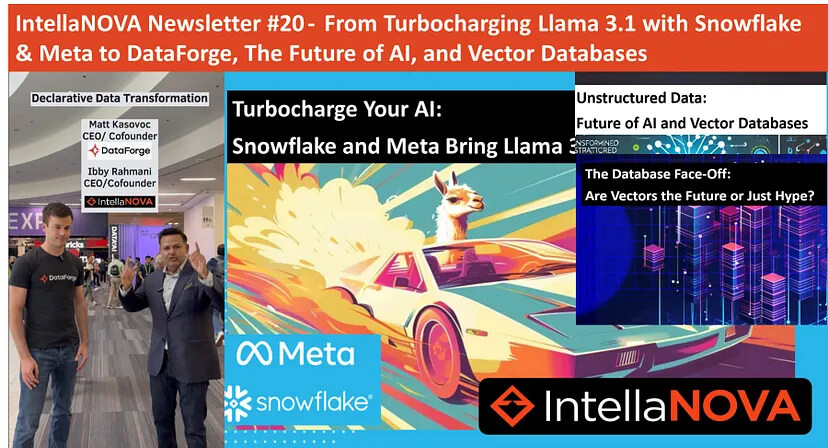
IntellaNOVA Newsletter #20: From turbocharging Llama 3.1 with Snowflake & Meta to DataForge, The Future of AI, and Vector Databases
Integrate, Scale, Conquer: The Data Forge Advantage in Data-Driven Enterprises
DataForge, an innovative ETL platform highlighted at the Databricks Summit. CEO Matt Kasovoc explains how DataForge differentiates itself by operating at a granular column level, unlike traditional platforms that only work at the table level. This approach enhances data transformation precision and allows the incorporation of advanced computer science principles. The platform’s scalability is key for enterprises undergoing rapid growth or frequent mergers, providing a flexible solution that adapts to expanding data infrastructures. Additionally, DataForge offers developer-friendly features like real-time guardrails, ensuring best practices and efficient coding. With its blend of granularity, scalability, and developer support, DataForge is positioned as a robust solution for modern enterprises seeking to optimize data integration and maintain data integrity.

Unleashing Unstructured Data Platforms: Fueling the Future of AI and Vector Databases
There is a growing importance of unstructured data transformation tools like Unstructured and Nexla in the AI landscape. As AI models like RAG (Retrieval-Augmented Generation) require processing diverse data types, these platforms play a crucial role in converting unstructured data — such as text, images, and audio — into structured formats like JSON, making it accessible and usable for AI systems. The future of these platforms will likely focus on dynamic schema adaptation, advanced semantic understanding, and full AI integration, enhancing flexibility, improving data insights, and streamlining the AI process. These developments will be essential for businesses aiming to leverage AI’s full potential, especially in managing complex, unstructured data.
The Database Face-Off: Are Vectors the Future or Just Hype?
The rise of vector databases and their impact on modern AI and ML applications cannot be overlooked. Unlike traditional relational databases, which are optimized for structured data and transactional integrity, vector databases excel at handling complex, unstructured data by storing it in high-dimensional vector spaces. This makes them ideal for tasks like similarity searches in AI-driven applications. However, the future of data management is not a zero-sum game; instead, it points to a hybrid approach where both traditional and vector databases coexist, each serving specific needs depending on the use case, data types, and performance requirements.
Turbocharge Your AI: Snowflake and Mets Bring Llama 3.1 to the Next Level
Snowflake’s collaboration with Meta introduces the Llama 3.1 405B model to the Cortex AI platform, making advanced AI more accessible and cost-effective for businesses of all sizes. With a massive 128K context window, it delivers unparalleled real-time inference and fine-tuning capabilities, reducing latency and boosting throughput. This partnership democratizes AI by allowing fine-tuning on just a single GPU, making cutting-edge AI accessible even to smaller teams, while Snowflake Cortex Guard ensures safe and trustworthy AI deployments across industries.



